Over 100 people braved a light rain shower to gather on Main Street in Lexington on Monday to celebrate Memorial Day and remember the men and women who had given their lives in service of the country.
“We cannot thank them for their service the way we do veterans on Veterans Day,” Mark Bryant, president of the George C. Marshall chapter of the Military Officers Association of America, said in his opening remarks. “We cannot repay them for the lives they lost in our service. What we can do is remember them. Today is for remembering.”
Lexington Mayor Frank Friedman spoke briefly on the history of Memorial Day, noting its origins as Decoration Day, a holiday established in 1868 which centered around putting flowers on the graves of soldiers who had died in defense of the country. It became an official federal holiday in 1971.
Friedman also made note of two local soldiers who had died in the service of their country, Chase Prasnicki and Andrew Ross, who were killed in Afghanistan in 2012 and 2018, respectively, as well as Terry Plunk, a member of the VMI class of 1988 who was killed in the Gulf War.
“We celebrate their unwavering commitment and dedication to God and to country, [and] we uplift the families that they left behind,” he said.
, page B12 “On this Memorial Day, we pause to remember all of the brothers and sisters who make it possible for us to gather in peace.”
The guest speaker for the ceremony was Col. Nichole Scott, who commands the Air Force ROTC unit at VMI. Scott is a career civil engineering officer with multiple deployments in support of Operation Enduring Freedom and Operation Iraqi Freedom. Prior to coming to VMI, she served as squadron commander of the 386th Expeditionary Civil Engineer Squadron at Ali Al Salem Air Base in Kuwait, the 375th Civil Engineer Squadron at Scott Air Force Base, Illinois and as the commander of the 316th Mission Support Group at Joint Base Andrews, Md.
At VMI, Scott noted, one of the things she teaches the seniors is the Military Code of Conduct, with particular emphasis on the first article of the code: “I am an American fighting in the forces which guard my country and our way of life. I am prepared to give my life in their defense.” She also encourages them to read the Constitution to know what it is they will be defending.
Scott also gave examples of soldiers who died in the line of duty. She first spoke of Medal of Honor recipient Master Sgt. John Chapman, who was killed in Operation Anaconda in Afghanistan in 2002. Chapman was part of a Special Forces unit assigned to create an outpost on a mountain in Afghanistan. Chapman’s unit came under heavy fire from Al Qaeda fighters and one of the members of the team fell out of the helicopter. Chapman and his team returned to rescue their fallen teammate and called for a Quick Reaction Force of Army Rangers for support when they came under heavy fire. Chapman engaged the enemy to allow the helicopter to land and was fatally shot.
She also told the story of Randall Derek Hall III, who died on March 22, 1991, along with 26 other men when two Navy P-3 Orion planes collided during a training operation. Hall was a radar operator on one of the planes. None of the bodies were recovered.
Both Chapman and Hall, Scott noted, left families behind. Chapman was survived by a wife and two daughters, while Hall left behind a 6-month-old daughter, a new wife and step-children.
“I was one of those stepchildren,” she said. “At the time, I was a teenager. I had no idea what it was like to be a military family, no idea of the sacrifices that military families make on a day-today basis. I was not able to tell him, ‘Thank you for your service.’
“I know it doesn’t seem enough for us to say ‘Let’s remember and honor them,’” she added. “But that’s what we need to do. I remember my mom grieving for a long time after the people stopped coming by to our house. But life goes on, right? And that’s what we do. We continue. We carry on.”
Scott concluded her remarks by quoting the epitaph on the memorial for the 3,000 British and Indian soldiers killed in the 1944 Battle of Kohima, a turning point in the Far East Theater of World War II: “When you go home, tell them of us, and say, ‘For your tomorrow, we gave our today.’”
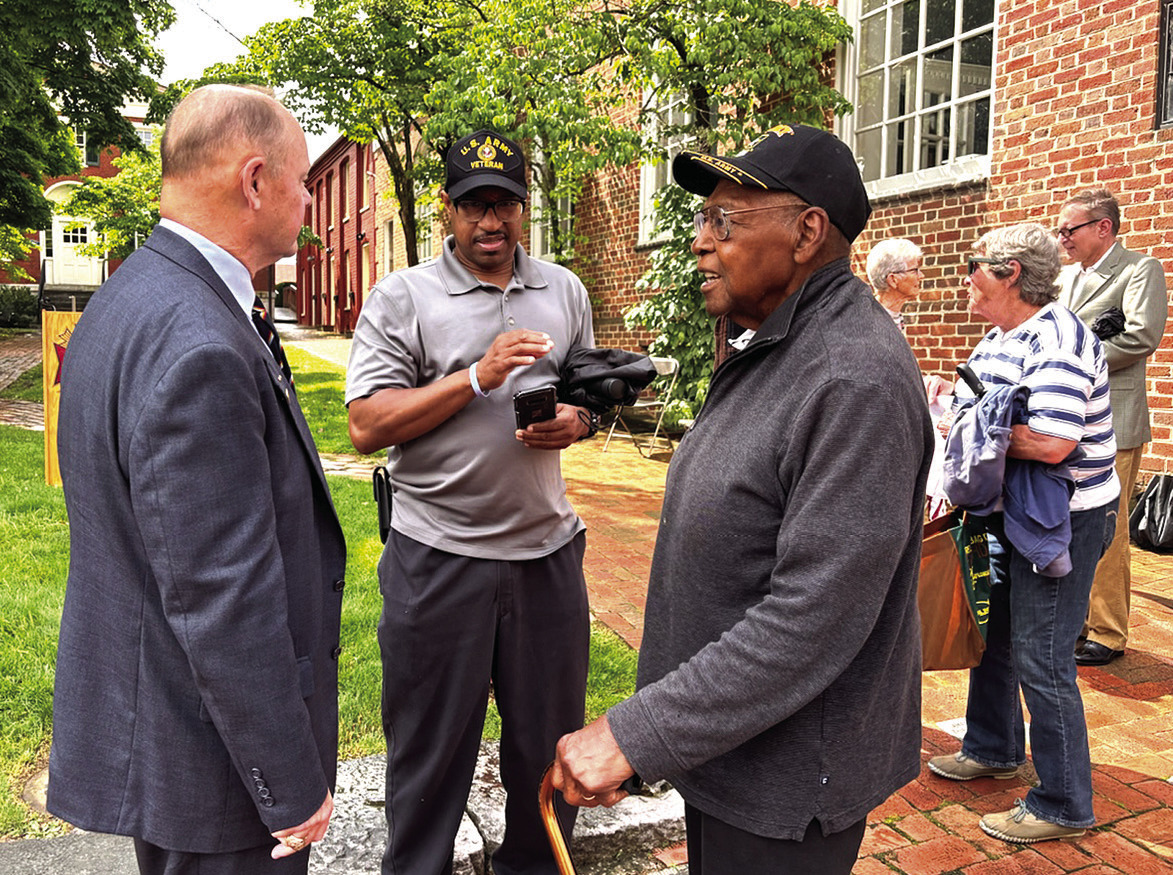
MARK BRYANT (left), president of the George C. Marshall chapter of the Military Officers Association of America, talks with local veterans John Curtis and Herman Dickerson following Monday’s ceremony. (Mary Woodson photo)
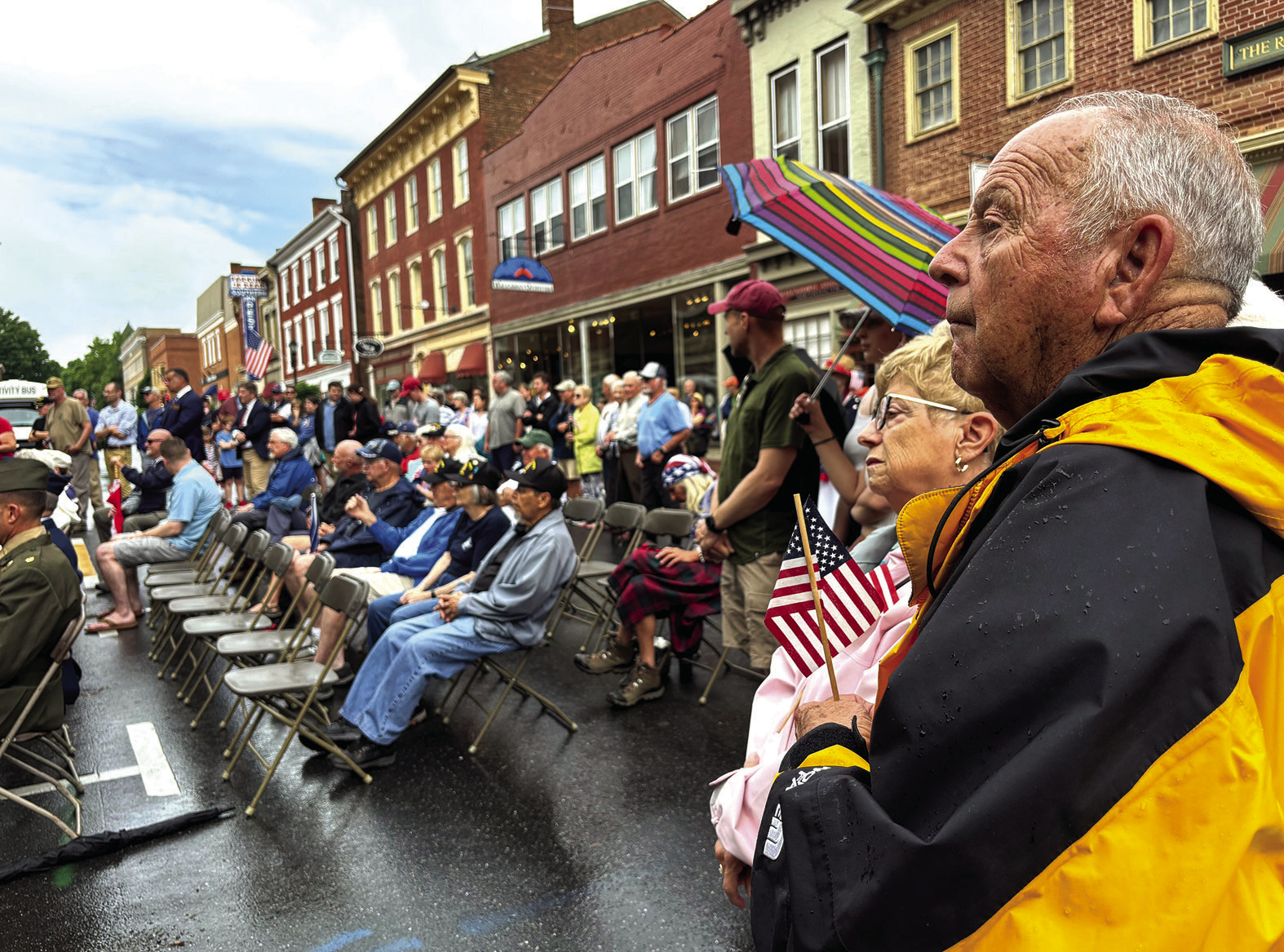
THE CROWD at Monday’s annual Memorial Day ceremony in downtown Lexington listens to one of the speakers. (Mary Woodson photo)
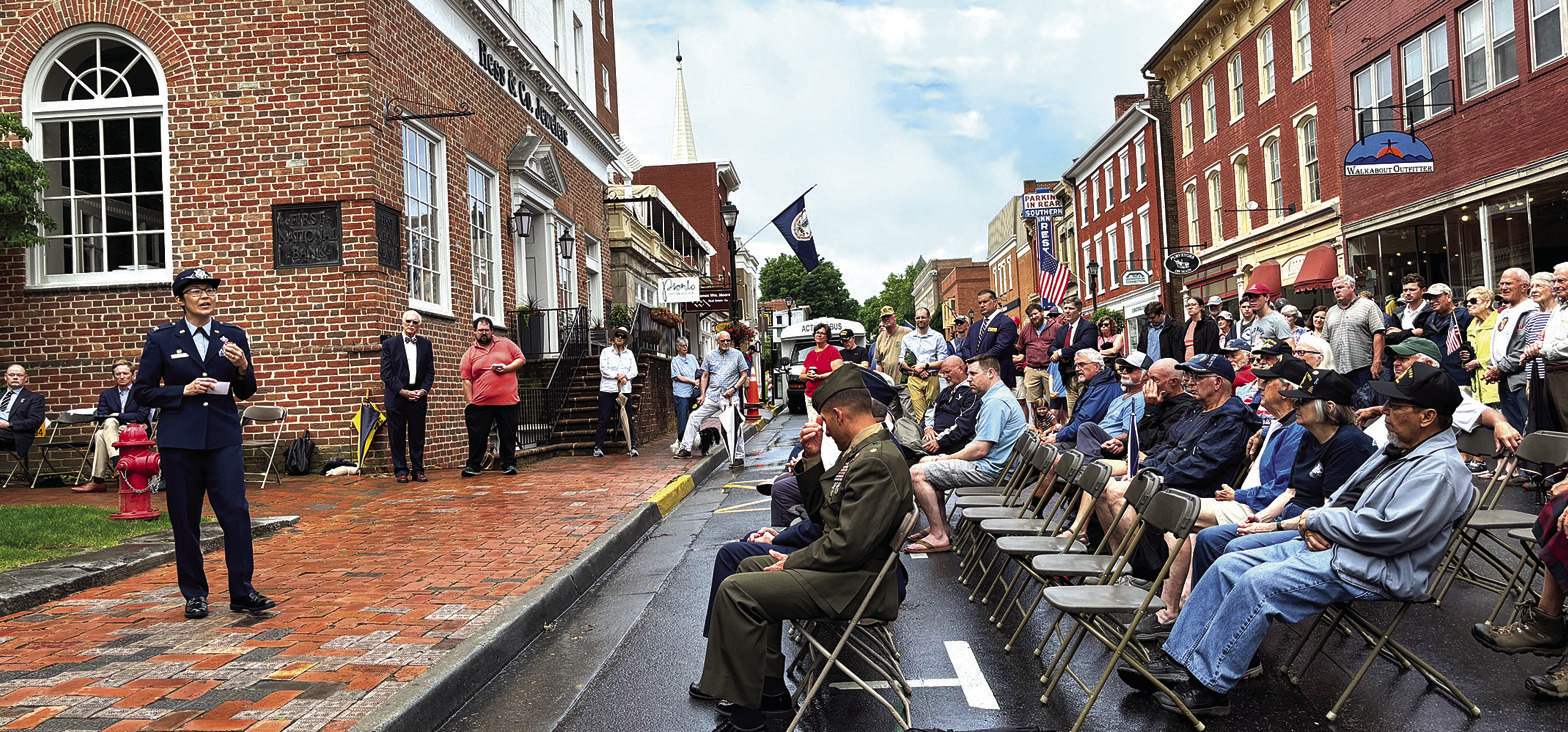
COL. NICHOLE SCOTT, the guest speaker at the Memorial Day ceremony, relates examples of those who died in the line of duty, including her own stepfather who was killed in a plane collision in 1991. (Mary Woodson photo)
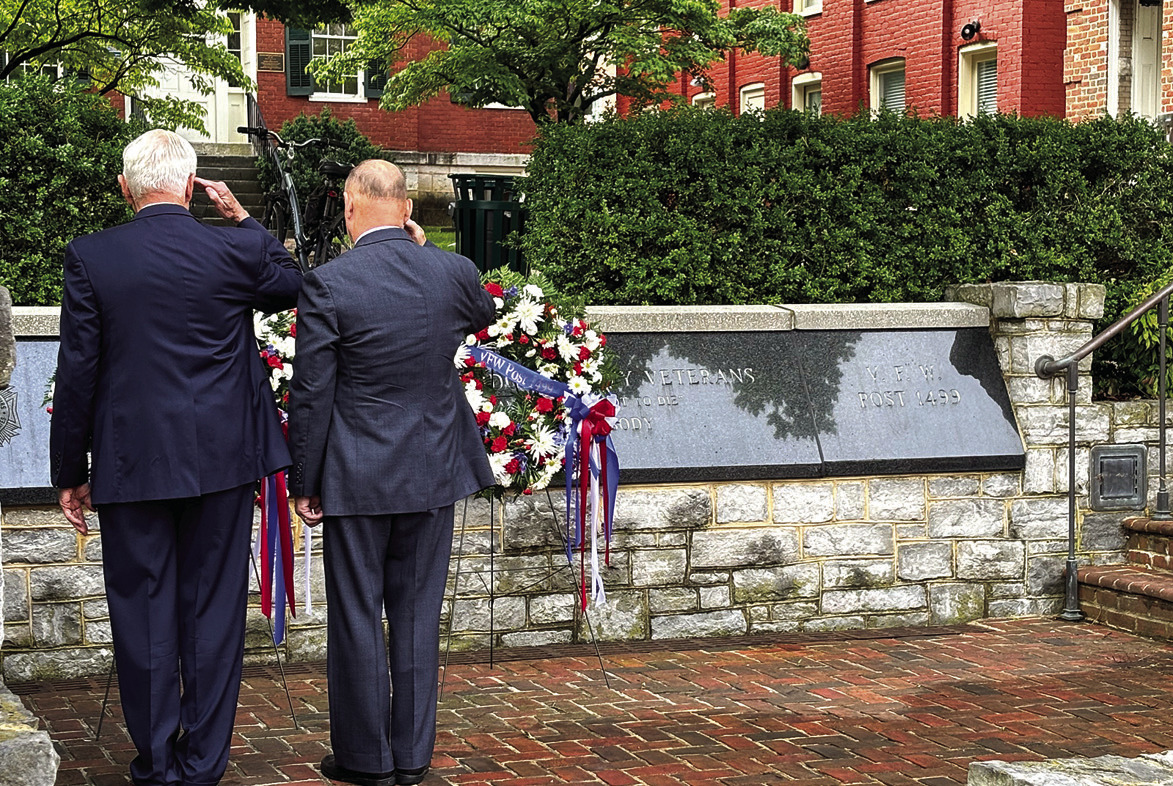
RETIRED NAVY COMMANDER Rich Hastings (left) and retired U.S. Army Col. Mark Bryant salute after placing the wreath from the local chapter of the Military Officers Association of America at the Veterans Memorial. (Mary Woodson photo)
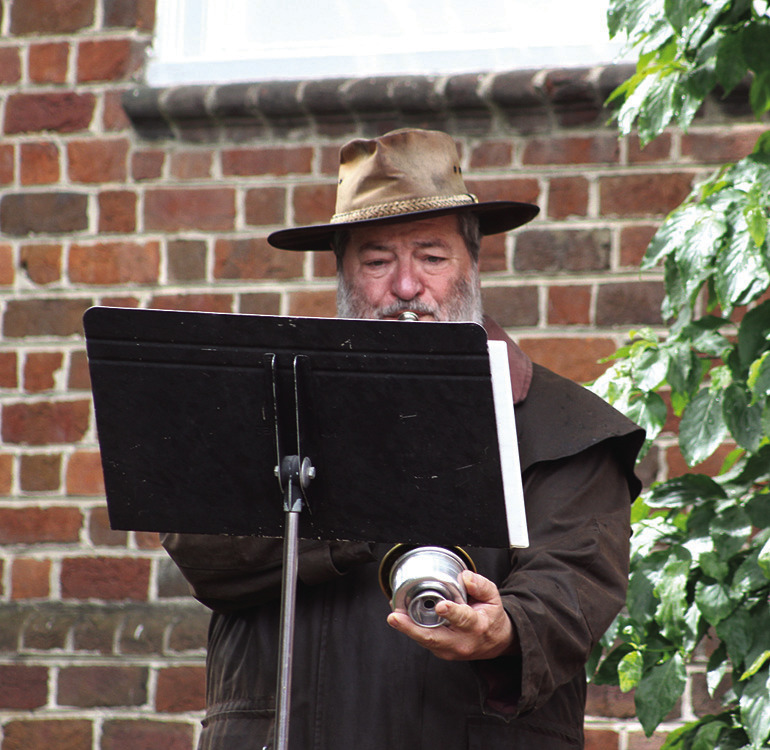
PETER DEL VECCIHO performs a medley of patriotic songs during Monday’s Memorial Day ceremony. (Mary Woodson photo)
.jpg)

